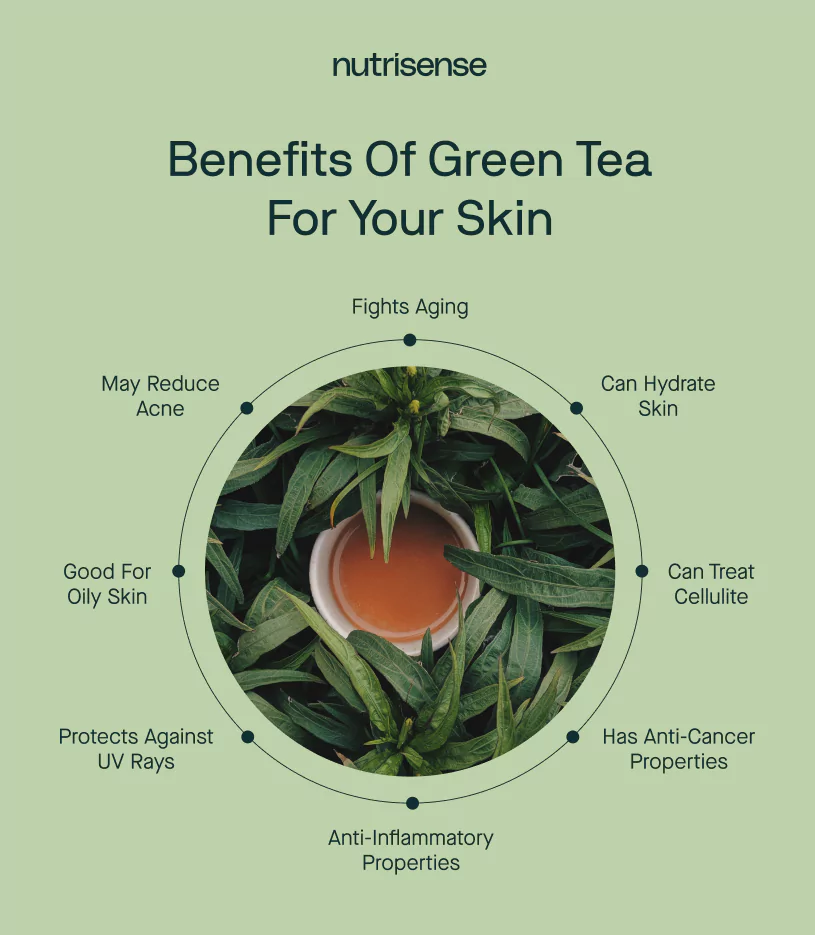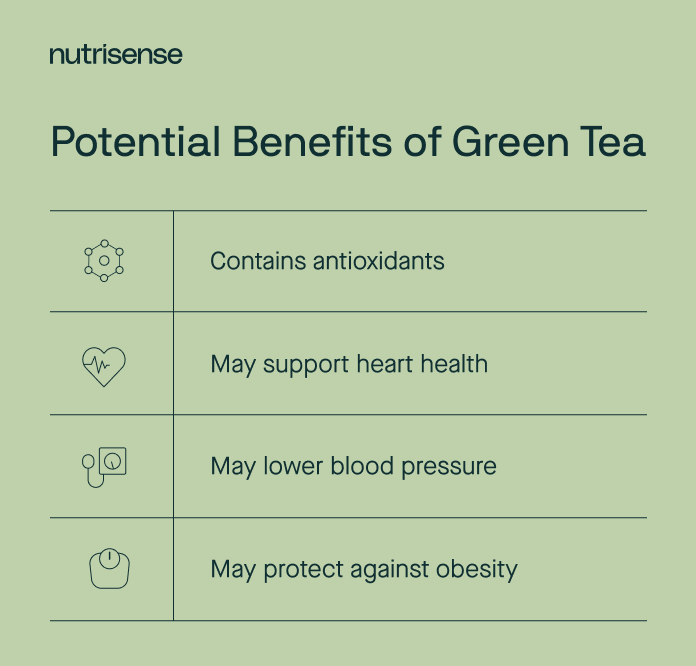8 Green Tea Benefits for Skin Health

Key Takeaways
Green tea has a long history— it’s been used in China since around 2700 BCE, where fresh tea leaves were boiled in water and used as a medicinal beverage. Because of this, you may think of nutritional benefits and antioxidants when you think of green tea.
But did you know that green tea can also be used as part of your skincare routine? In this article, we’ll explore the surprising possible benefits of green tea for your skin.
Where Does Tea Come From?
All teas originate from the same tea plant, called Camellia sinensis, but they are classified into three main types. Within these groups, there are dozens of different variations of tea, such as matcha, white tea, and pu-erh tea.

- Black tea, which is fermented
- Green tea, which is unfermented
- Oolong or pouchong, which is semi fermented
Green tea is made by a process of pan roasting or steaming young tea leaves, and then drying them. This process keeps the polyphenols in the leaves from oxidizing and keeps them from fermenting, allowing the leaves to remain green.
One cup of green tea contains about 28 milligrams of caffeine, which is why many people reach for this beverage to wake up in the morning. But green tea has also long been studied for potential health benefits, including possible protection against heart disease or digestive problems.
Green tea is an abundant source of plant polyphenols which, aside from the potential effects already mentioned, may also benefit your skin. Let’s take a look at some of these benefits.
Why Green Tea is Great for Skin Health

The benefits of green tea for your skin come from polyphenols called catechins. Catechins make up around 60-80 percent of the polyphenols in green tea.
These antioxidants help the body fight against free radicals, which can lead to inflammation and increased skin aging. There are four major catechins that can be found in green tea that are known for their antioxidant properties:
- Epigallocatechin-3-Gallate (EGCG)
- Epigallocatechin (EGC)
- Epicatechin Gallate (ECG)
- Epicatechin (EC)
All of these catechins have antioxidant, anti-inflammatory, antimicrobial, and anticarcinogenic properties. However, EGCG is the most bioactive and is responsible for most of green tea’s biochemical and pharmacological effects.
It’s important to note that the topical application of these antioxidants may have more impact on skin than oral ingestion. When orally consumed, the bioavailability of the herbal antioxidants is diminished.
Green tea skincare products usually include things like green tea face masks, lotions, and cleansers. Green tea leaves are also sometimes used for exfoliating the skin.
Here are eight ways green tea may be beneficial for any skin type:
1) Has Anti-inflammatory Properties
Studies have shown that topical application or oral consumption of green tea may have anti-inflammatory benefits for skin. The polyphenols in green tea may help suppress the immune responses that cause inflammation, like inhibiting the production of certain immune cells in response to environmental factors like UV rays.
Green tea has also been shown to help improve the symptoms of skin conditions such as psoriasis, rosacea, and eczema by reducing inflammation.
2) May Help Manage Acne

Recent studies have shown that polyphenols from tea may be helpful in reducing acne breakouts. One of the causes of acne is an overproduction of sebum, which is a mixture of lipids that is found in sebaceous glands throughout the body.
Studies show that topical tea polyphenols, including those from green tea, may reduce sebum production in the skin, suggesting it may be a possible approach to managing acne. These results are promising, but more studies with a larger sample size are needed to confirm these findings.
3) May Help Hydrate Your Skin
Just like the rest of your body, your skin needs hydration. When you have dry skin, it becomes less elastic and more prone to wrinkles.
Some studies have shown that drinking green tea may actually help in this area by increasing moisture retention in the skin, especially for those in dry environments. More long-term studies with larger sample sizes are needed.
4) Can Protect You From UV Rays

Ultraviolet radiation is a major environmental source of damage to the skin. It comes from sunlight, and can cause photoaging, inflammation, and even skin cancer.
While sunscreen is what most people turn to for sun protection, green tea can also be used to support the protection provided by your sunscreen. Studies have shown that, when topically applied, the polyphenols in green tea may have anti-inflammatory and protective effects against UV sun damage.
5) May Help Manage Oily Skin
If you have oily skin, recent studies may provide some hopeful news. The polyphenols in green tea may be able to reduce sebum production. This is also shown to help reduce oily skin.
6) May Fight Premature Aging

The polyphenols in green tea may have some anti-aging effects. Studies show that they can inhibit the activity of certain enzymes that have a destructive effect on lipids in the skin.
These enzymes can reduce the effectiveness of hyaluronic acid, elastin, and collagen, which are all compounds that help give skin its structure, strength, and elasticity. Inhibiting these enzymes may delay the signs of aging.
The tannins in green tea might also help shrink your blood vessels, which can improve dark circles and puffiness around the eyes.
7) Has Anti-Cancer Properties
Studies show that the polyphenols in green tea may have anti-cancer properties for the skin. Green tea has been shown to inhibit DNA damage, protect against harmful UV rays from the sun and even inhibit the growth of tumors.
These benefits may go beyond the skin, however, as some research also shows that green tea may help prevent bladder cancer. However, research is limited and future studies are needed to determine the best way to deliver these therapeutic benefits.
8) May Help Treat Cellulite

Cellulite is a common condition that causes dimples on certain areas of the body, like the thighs and hips. Cellulite is harmless, but some people try to reduce it in favor of smoother-looking skin.
Surprisingly, studies show that the caffeine in green tea may actually help minimize the appearance of cellulite. When topically applied, it may inhibit the accumulation of fat in the skin that causes the condition.
Green tea extract may also play a role in preventing the formulation of cellulite, but more research may still be needed to confirm the effectiveness.
Nutritional Benefits of Green Tea

In addition to potential benefits for skin health, there may be some other health and wellness benefits to consuming green tea.
Anti-Inflammatory
As we mentioned earlier, the catechins in green tea have anti-inflammatory properties. Studies show that they can inhibit the activity of certain immune cells, like neutrophils, that cause inflammation. However, many studies have been done in vitro, not in vivo.
This means that while cell culture studies show anti-inflammatory activity, there’s still controversy surrounding the effects inside the living human body. More research is needed to better understand this.
Contains Antioxidants

The polyphenols in green tea are potent antioxidants, which have numerous effects on health. Studies show that polyphenols may help prevent several chronic diseases, including cancer, heart disease, and diabetes.
May Help With Blood Sugar Regulation
Studies suggest that green tea polyphenols may also positively benefit blood sugar. According to research, the antioxidants in green tea may increase glucose tolerance and reduce blood glucose levels. However, some limitations to these studies were that they were often done in vitro and limited in vivo randomized controlled trials have been done.
May Protect Against Obesity

Green tea catechins, especially EGCG, may have anti-obesity effects. Some studies show that they might help modulate energy balance, endocrine function, food intake, and lipid and carbohydrate metabolism. However, more controlled studies are needed to confirm these effects in vivo.
May Improve Brain Function
Studies show that green tea may reduce psychopathological symptoms. These might include:
- Reducing anxiety
- Improving memory and attention
- Improving brain function and cognition
According to researchers, these effects are likely due to the combined effect of caffeine and L-theanine, an amino acid found in tea leaves. However, there are very few controlled trials looking at these properties and most studies reviewed were from correlational design where other variables may have impacted outcomes.
Anti-Cancer

Consumption of green tea may be linked to the prevention of many types of cancer. These may include lung, colon, esophagus, mouth, stomach, kidney, pancreas, and breast cancer.
Again, it’s good to be cautious about the claims here, since the majority of studies done have been in vitro, not in vivo. The antioxidant or anti-cancer activity of green tea bioactive compounds may be altered in the living human body compared to an in vitro model.
One animal study found that green tea significantly reduced the number of tumors in carcinogen-induced rats. However, more human studies may still be necessary to confirm these findings.
Good for Heart Health
Long-term consumption of green tea has been correlated with reduced risk of coronary heart disease. This may be due to its ability to lower blood pressure.
Lower Blood Pressure
Studies have shown that regular consumption of green tea may reduce blood pressure and reduce the risk of hypertension. Like many of the other health benefits of this drink, this is likely due to green tea’s antioxidant content.
How Much Green Tea Should You Drink Per Day?

It’s unclear exactly how much green tea you should drink to reap its health benefits, and the amount varies by study and by health benefit. For example, for
- Diabetes prevention: six or more cups per day appears to be the most effective
- Cardiovascular health: five or more cups have the highest effects
- Decreased risk of myocardial infarction: one to three cups
- Lower LDL cholesterol: more than 10 cups per day
While many of these studies suggest that drinking any amount of green tea can be beneficial, keep in mind that green tea contains caffeine. Drinking too much caffeine may:
- Increase anxiety and stress
- Disrupt sleep
- Aggravate certain digestive conditions
- Increase the incidence of headaches
It may also negatively impact blood sugar levels for some people. It’s also possible that higher intakes of caffeine may raise cortisol levels for certain individuals.
If you’re unsure how much green tea is safe for you to drink, consult your doctor.
Best Ways To Use Green Tea for Your Skin
If you want to apply green tea topically, you may want to consult a dermatologist to make sure they recommend this type of treatment.
Are There Any Risks to Using Green Tea for Skin?

Generally, green tea is considered safe and is shown to be well tolerated as a skin treatment in both human and animal studies.
If you are concerned about how you may react to green tea, consult your healthcare professional for guidance.
Find the right Nutrisense programto turn insight into progress.
Go Beyond Glucose Data with Nutrisense
Your glucose can significantly impact how your body feels and functions. That’s why stable levels are an important factor in supporting overall wellbeing. But viewing glucose isn't enough. Nutrisense, you’ll be able to learn how to use your body's data to make informed lifestyle choices that support healthy living.
One-to-one coaching
Sign up to access insurance-covered video calls to work with a glucose expert: a personal registered dietitian or certified nutritionist who will help tailor your lifestyle and diet to your goals.
Monitor and measure what matters
With the Nutrisense CGM Program, you can monitor your glucose with health tech like glucose biosensors and continuous glucose monitor (CGM)s, and analyze the trends over time with the Nutrisense App. This will help you make the most informed choices about the foods you consume and their impact on your health.
Find your best fit
Ready to take the first step? Start with our quiz to find the right Nutrisense program to help you take control.

Heather is a Registered and Licensed Dietitian Nutritionist (RDN, LDN), subject matter expert, and technical writer, with a master's degree in nutrition science from Bastyr University. She has a specialty in neuroendocrinology and has been working in the field of nutrition—including nutrition research, education, medical writing, and clinical integrative and functional nutrition—for over 15 years.


.webp)

